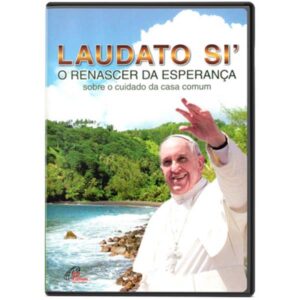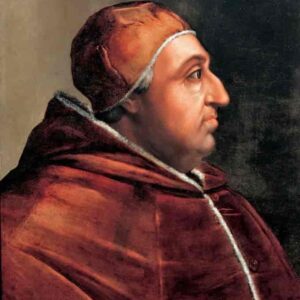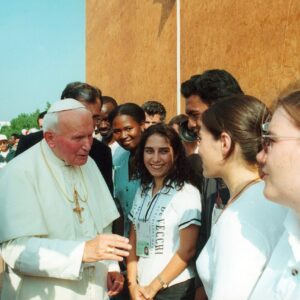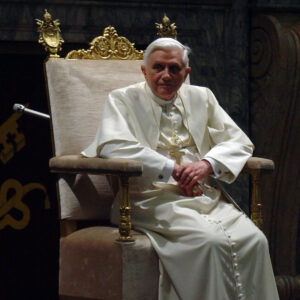Pope Francis declares that his latest encyclical letter, “Fratelli Tutti”, which came out on October 3, was inspired by Saint Francis. “This saint of fraternal love, simplicity and joy, who inspired me to write the Encyclical Laudato Si’, prompts me once more to devote this new Encyclical to fraternity and social friendship.”
Certainly today, amidst all the crises raging over our planet: wars, pandemics and environmental degradation, there is much need for a call to action and a reminder of our common humanity. And if you’re going to talk of fraternity and love, I can’t think of a better example to offer than Saint Francis. As Pope Francis reminds us:
“Francis did not wage a war of words aimed at imposing doctrines; he simply spread the love of God. He understood that ‘God is love and those who abide in love abide in God’ (1 Jn 4:16).”

His assessment of the current state of the world is indisputable: war, materialism, exclusion, destruction of the planet, inequality and injustice, these need to be eradicated. That road can only lead to extinction. We all agree.
“Today, in many countries, hyperbole, extremism and polarization have become political tools. Employing a strategy of ridicule, suspicion and relentless criticism, in a variety of ways one denies the right of others to exist or to have an opinion. Their share of the truth and their values are rejected and, as a result, the life of society is impoverished and subjected to the hubris of the powerful,”
many of us recognize Trump, and America as it is now perceived by much of the world. Written by the putative leader of the spiritual world, Pope Francis’s Encyclical letter is a powerful reminder of the dangerous path that we’re on, and he is right to admonish us to change our ways. But while the Pope’s self-stated claim was to further fraternity and “social friendship,” the encyclical is inevitably, both implicitly and explicitly, also a political manifesto.
What exactly is the role of the papacy? Ostensibly the pope is the spiritual head of the Catholic Church. More realistically, we should conclude that it is a political office. Admittedly, politics is inextricable from public life and even private life—every one of our daily acts implies politics in one way or another, even if inadvertently. (E.g. Do you buy patriotic or foreign, what charities do you give to, whom do you vote for? And lately we can also add: do you believe that the Covid-19 pandemic is real and do you wear a mask?)

Encyclicals have always functioned not only as spiritual guidance, but as political statements. We could start by questioning whether the Catholic Church should be getting into politics, except that it would be disingenuous to raise such a doubt. Everyone knows that the Roman Catholic Church has always been a powerful political entity and some of its leaders have become notorious for their political and spiritual corruption. The “Renaissance Popes” are synonymous with corruption and immorality, none more so than Rodrigo Borgia, as Pope Alexander VI, or Pope Leo X and Clement VIII, both Medicis–just to name a few.
Pope John XXIII is generally considered to be the most spiritual of the historically recent popes and is remembered for having convoked the highly successful Second Vatican Council (1960) which brought needed reforms to the Church, changes that reshaped the face of Catholicism: a comprehensively revised liturgy, a stronger emphasis on ecumenism, and a new awareness of human solidarity. Yet if we look more closely, he too was a potent blend of politics and spirituality. His “Ostpolitik” (“Eastern policy”) opened a dialogue with the Communist countries of Eastern Europe, to reconcile the Vatican with the Russian Orthodox Church, but in its attempt to bring about a rapprochement, the Second Vatican Council did not condemn Communism and did not even mention it. Many viewed it as a secret agreement between the Holy See and the Soviet Union.

For John Paul II, born as Karol Wojtyła, politics was central to his mission, not only as a young man, before he became Pope, but during his tenure. Pope Benedict XVI, born as Joseph Ratzinger, brought a ton of political baggage with him that made him controversial. He was accused of being “Dogged by Hitler Youth Past…”, as one article summarized it.
And Pope Francis, like John Paul II, was an active and proud political activist in his native Argentina. Yet there are serious and persistent doubts about his actions. “Two journalistic investigations – one in 1986, the other in 2005 – argued that the new Pope was a ‘collaborationist’ with the military government” of the “dirty war” known for the thousands of “desaparecidos”—dissidents who disappeared forever without a trace. To be fair, there are also those who claim that he secretly opposed the generals and helped their opposition, but still, there is doubt and controversy.

I don’t question Christian values, though I prefer to think of them as universal values shared by all religions– whether you call then 10 Commandments or the “Golden Rule”. I commend Pope Francis for having included several mentions of Islam in this encyclical. His reference to the Grand Imam Ahmad Al-Tayyeb, “with whom I met in Abu Dhabi, where we declared that ‘God has created all human beings equal in rights, duties and dignity, and has called them to live together as brothers and sisters’” is spot on and consistent with the ideals of human justice. But there is a wide gap between the Church’s spiritual ideals and their policies and practices.
Pope Francis speaks of “the deformation of democracy” and certainly even on a global level, with all of the populist neo-Fascist authoritarian figures such as Trump, Bolsonaro and Modi that have emerged in the past decade, we are in the process of redefining the concept, but I do question whether an organization that excludes a priori half of the human population, that is, women, from serving in the priesthood (i.e positions of power within its organization) and by so doing relegates them to the status of second-class citizens only good enough to serve in subjugation to priests, should have any say about democracy.

And yet Pope Francis states that he offers the encyclical as a,
“modest contribution to continued reflection, in the hope that in the face of present-day attempts to eliminate or ignore others, we may prove capable of responding with a new vision of fraternity and social friendship that will not remain at the level of words.”
Inclusivity could very well start within the Church, and yet this is not the case.
It is also legitimate to question the credibility of an organization that cannot—or will not—clean its own house of pedophilia, corruption and cover-ups. Should it be making pronouncements on spiritual matters or moral behavior? It has thus far shelled out billions of dollars in settlements on the above-mentioned pedophilia—as much as $4 billion according to Newsweek–– in order to avoid disclosure and punishment of the guilty. Perhaps we can make some allowance for the fact that even with the best of intentions and good will no one individual can bring about such sweeping changes, but the fact remains that despite Francis’ efforts, the situation remains unresolved.
Nor is that the only association of financial corruption in the Vatican. The Monsignor Scarano scandal is still fresh in the minds of those who followed it. Money laundering at the Vatican Bank had been going on for years, and Scarano was not the only one involved. “Monsignor Scarano [was] a small fish in the pond of the Vatican financial system, the accusations against him a mere symptom of much larger problems…” The good news is that “Pope Francis is now energetically trying to correct” this.
So, when Pope Francis asks, “Nowadays, what do certain words like democracy, freedom, justice or unity really mean? They have been bent and shaped to serve as tools for domination, as meaningless tags that can be used to justify any action,” we can ask ourselves: How much distance is there between idealized concepts and practical action? If the leader of the spiritual world cannot put the ideals into action in his own ‘House’, what hope is there for the rest of the world? Still, it’s a nice try. This encyclical letter is something to inspire us.












